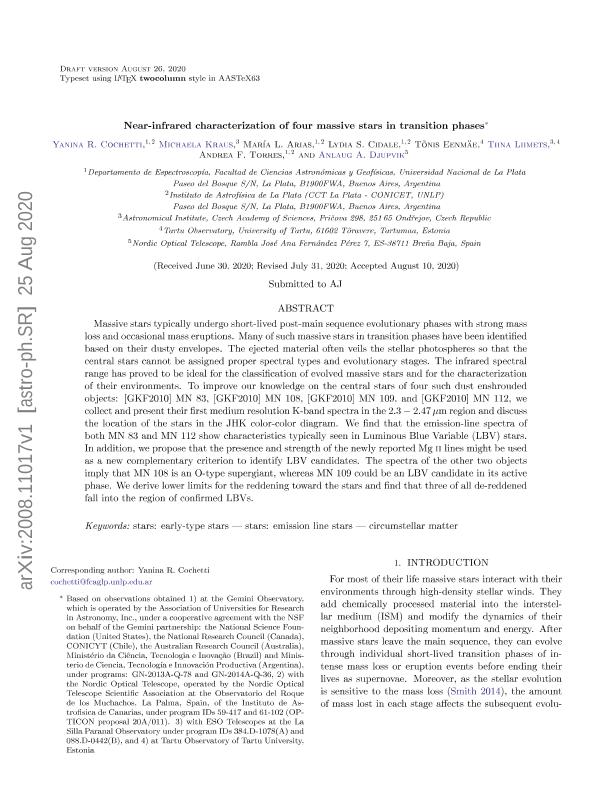Mostrar el registro sencillo del ítem
dc.contributor.author
Cochetti, Yanina Roxana

dc.contributor.author
Kraus, Michaela

dc.contributor.author
Arias, María Laura

dc.contributor.author
Cidale, Lydia Sonia

dc.contributor.author
Eenmäe, Tõnis
dc.contributor.author
Liimets, Tiina

dc.contributor.author
Torres, Andrea Fabiana

dc.contributor.author
Djupvik, Anlaug A.
dc.date.available
2021-10-20T14:26:10Z
dc.date.issued
2020-10
dc.identifier.citation
Cochetti, Yanina Roxana; Kraus, Michaela; Arias, María Laura; Cidale, Lydia Sonia; Eenmäe, Tõnis; et al.; Near-infrared Characterization of Four Massive Stars in Transition Phases; IOP Publishing; Astronomical Journal; 160; 4; 10-2020; 166-169
dc.identifier.issn
0004-6256
dc.identifier.uri
http://hdl.handle.net/11336/144435
dc.description.abstract
Massive stars typically undergo short-lived post-main-sequence evolutionary phases with strong mass loss and occasional mass eruptions. Many of such massive stars in transition phases have been identified based on their dusty envelopes. The ejected material often veils the stellar photospheres so that the central stars cannot be assigned proper spectral types and evolutionary stages. The infrared spectral range has proved to be ideal for the classification of evolved massive stars and for the characterization of their environments. To improve our knowledge on the central stars of four such dust-enshrouded objects, [GKF 2010] MN 83, [GKF 2010] MN 108, [GKF 2010] MN 109, and [GKF 2010] MN 112, we collect and present their first medium-resolution K-band spectra in the 2.3-2.47 μm region and discuss the location of the stars in the JHK color-color diagram. We find that the emission-line spectra of both MN 83 and MN 112 show characteristics typically seen in luminous blue variable (LBV) stars. In addition, we propose that the presence and strength of the newly reported Mg II lines might be used as a new complementary criterion to identify LBV candidates. The spectra of the other two objects imply that MN 108 is an O-type supergiant, whereas MN 109 could be an LBV candidate in its active phase. We derive lower limits for the reddening toward the stars and find that three of all dereddened fall into the region of confirmed LBVs.
dc.format
application/pdf
dc.language.iso
eng
dc.publisher
IOP Publishing

dc.rights
info:eu-repo/semantics/openAccess
dc.rights.uri
https://creativecommons.org/licenses/by-nc-sa/2.5/ar/
dc.subject
EARLY-TYPE STARS
dc.subject
CIRCUMSTELLAR MATTER
dc.subject
EMISSION LINES
dc.subject.classification
Astronomía

dc.subject.classification
Ciencias Físicas

dc.subject.classification
CIENCIAS NATURALES Y EXACTAS

dc.title
Near-infrared Characterization of Four Massive Stars in Transition Phases
dc.type
info:eu-repo/semantics/article
dc.type
info:ar-repo/semantics/artículo
dc.type
info:eu-repo/semantics/publishedVersion
dc.date.updated
2021-09-06T17:44:05Z
dc.identifier.eissn
1538-3881
dc.journal.volume
160
dc.journal.number
4
dc.journal.pagination
166-169
dc.journal.pais
Estados Unidos

dc.journal.ciudad
Chicago
dc.description.fil
Fil: Cochetti, Yanina Roxana. Consejo Nacional de Investigaciones Científicas y Técnicas. Centro Científico Tecnológico Conicet - La Plata. Instituto de Astrofísica La Plata. Universidad Nacional de La Plata. Facultad de Ciencias Astronómicas y Geofísicas. Instituto de Astrofísica La Plata; Argentina. Universidad Nacional de la Plata. Facultad de Cs.astronómicas y Geofísicas. Departamento de Espectrocopia Estelar; Argentina
dc.description.fil
Fil: Kraus, Michaela. Astronomical Institute, Czech Academy Of Sciences; República Checa
dc.description.fil
Fil: Arias, María Laura. Consejo Nacional de Investigaciones Científicas y Técnicas. Centro Científico Tecnológico Conicet - La Plata. Instituto de Astrofísica La Plata. Universidad Nacional de La Plata. Facultad de Ciencias Astronómicas y Geofísicas. Instituto de Astrofísica La Plata; Argentina. Universidad Nacional de la Plata. Facultad de Cs.astronómicas y Geofísicas. Departamento de Espectrocopia Estelar; Argentina
dc.description.fil
Fil: Cidale, Lydia Sonia. Universidad Nacional de la Plata. Facultad de Cs.astronómicas y Geofísicas. Departamento de Espectrocopia Estelar; Argentina. Consejo Nacional de Investigaciones Científicas y Técnicas. Centro Científico Tecnológico Conicet - La Plata. Instituto de Astrofísica La Plata. Universidad Nacional de La Plata. Facultad de Ciencias Astronómicas y Geofísicas. Instituto de Astrofísica La Plata; Argentina
dc.description.fil
Fil: Eenmäe, Tõnis. University Of Tartu. Faculty Of Science And Technology. Tartu Observatory.; Estonia
dc.description.fil
Fil: Liimets, Tiina. University Of Tartu. Faculty Of Science And Technology. Tartu Observatory.; Estonia. Astronomical Institute, Czech Academy Of Sciences; República Checa
dc.description.fil
Fil: Torres, Andrea Fabiana. Universidad Nacional de la Plata. Facultad de Cs.astronómicas y Geofísicas. Departamento de Espectrocopia Estelar; Argentina. Consejo Nacional de Investigaciones Científicas y Técnicas. Centro Científico Tecnológico Conicet - La Plata. Instituto de Astrofísica La Plata. Universidad Nacional de La Plata. Facultad de Ciencias Astronómicas y Geofísicas. Instituto de Astrofísica La Plata; Argentina
dc.description.fil
Fil: Djupvik, Anlaug A.. Nordic Optical Telescope; España
dc.journal.title
Astronomical Journal

dc.relation.alternativeid
info:eu-repo/semantics/altIdentifier/url/https://iopscience.iop.org/article/10.3847/1538-3881/abae62
dc.relation.alternativeid
info:eu-repo/semantics/altIdentifier/doi/http://dx.doi.org/10.3847/1538-3881/abae62
Archivos asociados
